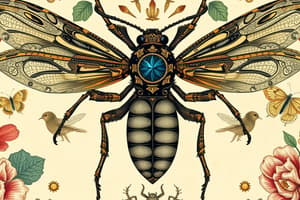Podcast
Questions and Answers
What does the term 'Hexapoda' refer to?
What does the term 'Hexapoda' refer to?
- Two legs
- Six legs (correct)
- Four legs
- Eight legs
What is the primary characteristic of the class Insecta?
What is the primary characteristic of the class Insecta?
True insects
What is an exoskeleton?
What is an exoskeleton?
Tough Outer Shell
What does O.Dermaptera refer to?
What does O.Dermaptera refer to?
What are the characteristics of O.Orthoptera?
What are the characteristics of O.Orthoptera?
What is defoliation?
What is defoliation?
What does the term 'Orthopteroid Order' signify?
What does the term 'Orthopteroid Order' signify?
What does F.Acrididae represent?
What does F.Acrididae represent?
What classification does F.Tettigoniidae fall under?
What classification does F.Tettigoniidae fall under?
What does F.Gryllidae refer to?
What does F.Gryllidae refer to?
What is O.Mantodea known as?
What is O.Mantodea known as?
What is found in O.Blattoidea?
What is found in O.Blattoidea?
What does F.Blattidae represent?
What does F.Blattidae represent?
What does F.Blattellidae include?
What does F.Blattellidae include?
What is the meaning of O.Thysanoptera?
What is the meaning of O.Thysanoptera?
What is the Hemipteroid Order known for?
What is the Hemipteroid Order known for?
What is defined by chewing mouthparts?
What is defined by chewing mouthparts?
What are piercing/sucking mouthparts characterized by?
What are piercing/sucking mouthparts characterized by?
What do sponge-like mouthparts refer to?
What do sponge-like mouthparts refer to?
What is the function of tube-like mouthparts?
What is the function of tube-like mouthparts?
Complete metamorphosis consists of 4 life cycles: Egg, Larvae, Pupae, ______
Complete metamorphosis consists of 4 life cycles: Egg, Larvae, Pupae, ______
Simple metamorphosis consists of 3 life cycles: Egg, ______, Adult
Simple metamorphosis consists of 3 life cycles: Egg, ______, Adult
Insects undergoing gradual metamorphosis have nymphs that look similar to adults.
Insects undergoing gradual metamorphosis have nymphs that look similar to adults.
In ametamorphosis, nymphs and adults do not have wings.
In ametamorphosis, nymphs and adults do not have wings.
Incomplete metamorphosis includes nymphs that are aquatic.
Incomplete metamorphosis includes nymphs that are aquatic.
Flashcards are hidden until you start studying
Study Notes
Overview of Hexapoda and Insect Orders
- Subphylum Hexapoda characterized by 'six legs' and divided into three regions: Head, Thorax, Abdomen.
- Insects possess antennae, with some larvae (e.g., butterfly and moth) having false legs or prolegs.
Class Insecta
- Encompasses true insects with diverse adaptations and ecological roles.
Exoskeleton
- Insects have a tough outer shell that provides structure and protection.
Order Dermaptera
- Known as 'Skin wings', includes earwigs which have pinchers for defense and prey capture.
- Exhibits simple 'gradual' metamorphosis with chewing mouthparts.
Order Orthoptera
- Translates to 'Straight Wing', includes grasshoppers, crickets, locusts, and katydids.
- Notable for chewing mouthparts, powerful hind legs, and significance as serious plant pests involved in defoliation.
Defoliation
- The process of stripping leaves, often related to pest damage.
Orthopteroid Orders
- Comprises orders characterized by chewing mouthparts.
Families within Orthoptera
- Acrididae: Grasshoppers.
- Tettigoniidae: Katydids.
- Gryllidae: Crickets.
Order Mantodea
- Commonly known as mantids; known for their predatory behavior.
Order Blattodea
- Includes roaches and termites with simple 'gradual' metamorphosis and nocturnal behavior.
- Known to transmit diseases such as Streptococcus and Salmonella.
Families within Blattodea
- Blattidae: Orientals and American cockroaches.
- Blattellidae: German and wood cockroaches.
Order Thysanoptera
- Referred to as 'fringe wing', consists of thrips which have sucking mouthparts and are serious agricultural pests.
Hemipteroid Orders
- Characterized by sucking mouthparts adapted for feeding.
Mouthpart Types
- Chewing Mouthparts: Comprised of labrum, mandibles, maxillae, and labium for food manipulation, seen in Coleoptera and Orthoptera.
- Piercing/Sucking Mouthparts: Modified labrum and maxilla with needle-like stylets for salivary and food channels common in Hemiptera.
- Sponge-like Mouthparts: Proboscis adapted for soaking up food through capillary action, typical in Diptera.
- Tube-like Mouthparts: Proboscis designed for siphoning nectar or water in Lepidoptera adults.
Metamorphosis Types
- Complete Metamorphosis: Involves four distinct life stages (egg, larvae, pupae, adult) with larvae differing significantly from adults.
- Simple Metamorphosis: Consists of three stages (egg, nymph, adult) with nymphs resembling miniature adults.
- Gradual Metamorphosis: Terrestrial insects where nymphs and adults share a close resemblance, as seen in grasshoppers and Hemiptera.
- Ametamorphosis: Involves insects where nymphs and adults appear the same, with both lacking wings, e.g., silverfish.
- Incomplete Metamorphosis: Aquatic nymphs (naiads) differing from terrestrial adults, observed in species like dragonflies.
Studying That Suits You
Use AI to generate personalized quizzes and flashcards to suit your learning preferences.




